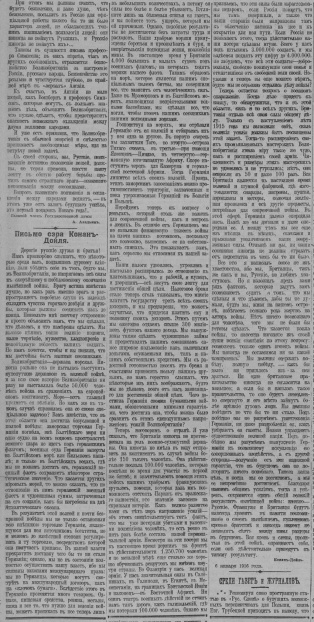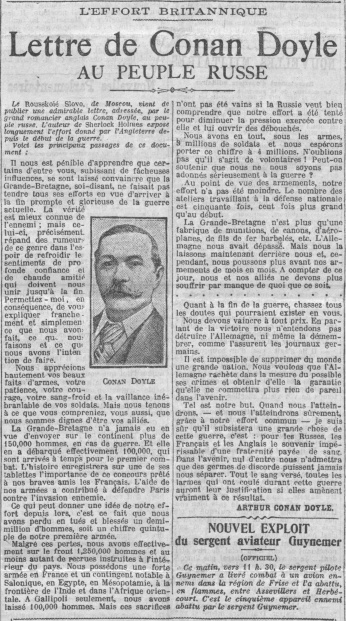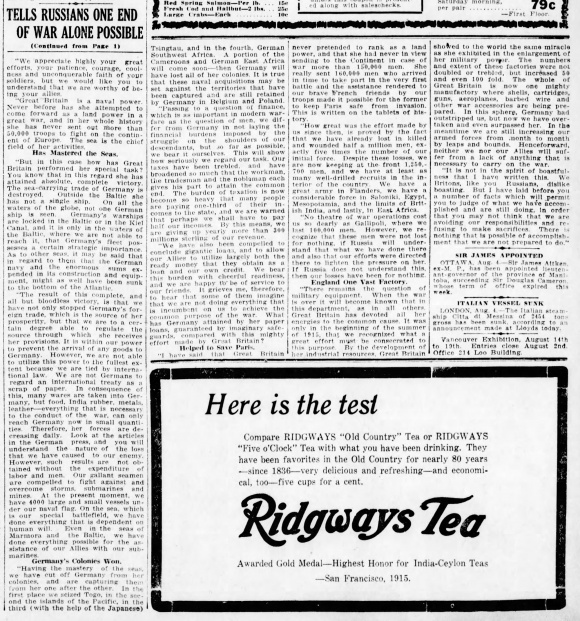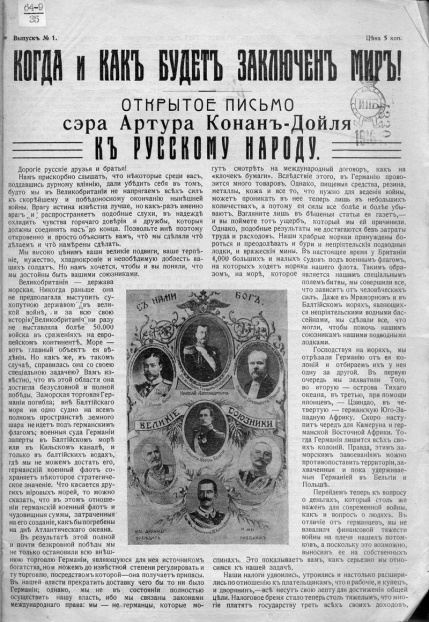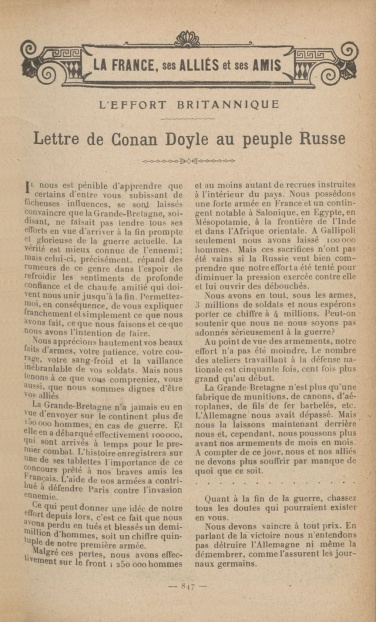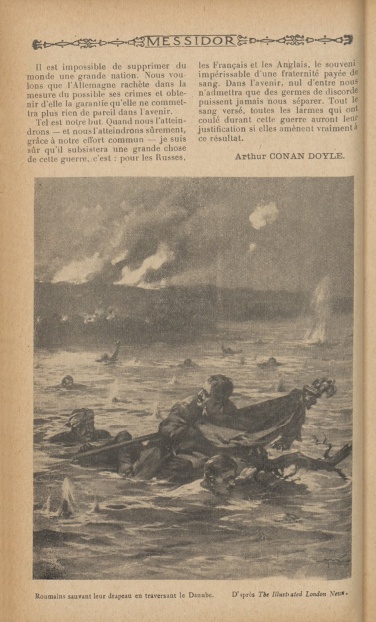Message from Sir Conan Doyle
Message from Sir Conan Doyle is a letter written by Arthur Conan Doyle first published in Russky Invalid (Russia) on 10 january 1916.
The letter was addressed to Russians Friends and Brothers in order to strengthen alliance between Great Britain and Russia and bring the war to a speedy and victorious end.
Editions
- in Русский Инвалид (Russky Invalid) (10 (23) january 1916 [RU])
- in Нoвое Bрeмя (New Time) (11 (24) january 1916 [RU])
- in Русское Cлово (Russian Word) (between 10 (23) january and 22 january (6 february) 1916 [RU])
- mention in The Times (26 january 1916 [UK])
- mention in The Daily Chronicle (ca. 25 january 1916 [UK])
- mention in Lancashire Evening Post (26 january 1916 [UK])
- mention in Manchester Courier And Lancashire General Advertiser (26 january 1916 [UK])
- in Наш Вестник (Our Messenger) No. 124 (19 january (3 february) 1916 [RU]) shortened version
- in Известия штаба XII армии (Transactions of the 12th Army Headquarters) No. 162 (25 january (9 february) 1916 [RU]) shortened version
- in Армейский вестник (Army Messenger) No. 221 (1916 [RU]) shortened version
- in Издание Миръ и Война (Peace and War publication) (1916 [RU]) as When and How Peace will be Made! (Когда и Какъ Будетъ Заключенъ Миръ!)
- mention in Portsmouth Evening News (5 february 1916 [UK])
- in Le Journal (6 february 1916 [FR]) as Lettre de Conan Doyle au peuple russe (shortened version)
- in Le Figaro (7 february 1916 [FR]) as Les lendemains (short extract)
- mention in The Scotsman (8 february 1916 [UK])
- mention in Horowhenua Chronicle (18 march 1916 [NZ])
- mention in The Hawkes Bay Tribune (18 march 1916 [NZ])
- mention in Poverty Bay Herald (25 march 1916 [NZ])
- in The Vancouver Daily World (4 august 1916 [US]) as One End of War Alone Possible (shortened version)
- in La Grande Guerre par les Grands Écrivains (5 february 1917, Messidor [FR]) as Lettre de Conan Doyle au peuple Russe
Message from Sir Conan Doyle

Dear Russian friends and brothers,
We are grieved to hear that some among you have allowed yourselves to be convinced that we in Great Britain are not straining all our resources toward bringing the war to a speedy and victorious end. The enemy knows the truth better, and it is the enemy who is spreading such rumors in the hope of cooling the feelings of friendship and trust which ought to unite us to the end. Permit me, therefore, to explain to you frankly and simply what we have done, and what we are doing, and what we intend to do.
We appreciate highly your great efforts, your patience, courage, coolness and unconquerable faith of your soldiers, but we would like you to understand that we are worthy of being your allies.
Great Britain is a naval power. Never before has she attempted to come forward as a land power in a great war, and in her whole history she has never sent out more than 50,000 troops to fight on the continent of Europe. The sea is the chief field of her activities.
But in this case how has Great Britain performed her special task? You know that in this regard she has attained absolute, complete victory. The sea-carrying trade of Germany is destroyed. Outside the Baltic she has not a single ship. On all the waters of the globe, not one German ship is seen. Germany's warships are locked in the Baltic or in the Kiel canal, and it is only in the waters of the Baltic, where we are not able to reach it, that Germany's fleet possesses a certain strategic importance. As to other seas, it may be said that in regard to them that the German navy and the enormous sums expended in its construction and equipment, might as well have been sunk to the bottom of the Atlantic.
The result of this complete, and all but bloodless victory, is that we have not only stopped Germany's foreign trade, which is the source of her prosperity, but that we are to a certain degree able to regulate the source through which she receives her provisions. It is within our power to prevent the arrival of any goods to Germany. However, we are not able to utilize this power to the fullest extent because we are tied by international law. We are not Germans to regard an international treaty as a scrap of paper. In consequence of this, many wares are taken into Germany, but food, India rubber, metals, leather — everything that is necessary to the conduct of the war, can only reach Germany now in small quantities. Therefore, her forces are decreasing daily. Look at the articles in the German press, and you will understand the nature of the loss that we have caused to our enemy. However, such results are not obtained without the expenditure of labor and men. Our gallant seamen are compelled to fight against and overcome storms, submarines and mines. At the present moment, we have 4000 large and small vessels under our naval flag. On the sea, which is our special battlefield, we have done everything that is dependent on human will. Even in the seas of Marmora and the Baltic, we have done everything possible for the assistance of our Allies with our submarines.
Having the mastery of the seas, we have cut off Germany from her colonies, and are capturing them from her one after the other. In the first place we seized Togo, in the second the islands of the Pacific, in the third (with the help of the Japanese) Tsingtau, and in the fourth, German Southwest Africa. A portion of the Cameroons and German East Africa will come soon — then Germany will have lost all of her colonies. It is true that these naval acquisitions may be set against the territories that have been captured and are still retained by Germany in Belgium and Poland.
Passing to a question of finance, which is as important in modern warfare as the question of men, we differ from Germany in not laying the financial burdens imposed by the struggle on the shoulders of our descendants, but so far as possible, we bear it ourselves. This will show how seriously we regard our task. Our taxes have been trebled, and have broadened so much that the workman, the tradesman and the nobleman each gives his part to attain the common end. The burden of taxation is now become so heavy that many people are paying one-third of their incomes to the state, and we are warned that perhaps we shall have to pay half our incomes. By this means, we are giving up yearly more than 300 millions sterling of our revenue
We have also been compelled to conclude gigantic loans, and to allow our Allies to utilize largely both the ready money that they obtain as a loan and our own credit. We bear this burden with cheerful readiness, and we are happy to be of service to our friends. It grieves me, therefore, to hear that some of them imagine that we are not doing everything that is incumbent on us to achieve the common purpose of the war. What has Germany attained by her paper loans, guaranteed by imaginary safeguards, compared with this mighty effort made by Great Britain?
I have said that Great Britain never pretended to rank as a land power, and that she had never in view sending to the Continent in case of war more than 150,000 men. She really sent 160,000 men who arrived in time to take part in the very first battle and the assistance rendered to our brave French friends by our troops made it possible for the former to keep Paris safe from invasion. This is written on the tablets of history.
How great was the effort made by us since then, is proved by the fact that we have already lost in killed and wounded half a million men, exactly five times the number of our initial force. Despite these losses, we are now keeping at the front 1,250,700 [1] men, and we have at least as many well-drilled recruits in the interior of the country. We have a great army in Flanders, we have a considerable force in Saloniki, Egypt, Mesopotamia, and the limits of British India, and lastly, in East Africa.
No theatre of war operations cost us so dearly as Gallipoli, where we last 100,000 men. However, we recognize that these men were not lost for nothing, if Russia will understand that what we have done there and also that our efforts were directed there to lighten the pressure on her. If Russia does not understand this, then our losses have been for nothing. We are having 3,000,000 soldiers under arms but we hope to raise the number to 4,000,000. Let us not forget that all these soldiers are volunteers who have parted with their families voluntarily and who have surrendered their own free will. How can you really believe that we did not espouse the cause of war seriously? [2]
There remains the question of military equipment. When the war is over it will become known that in this department, as in all others. Great Britain has devoted all her energies to the common cause. It was only in the beginning of the summer of 1915, that we recognized what a great effort must be consecrated to this purpose. By the development of her industrial resources, Great Britain showed to the world the same miracle as she exhibited in the enlargement of her military power. The numbers and extent of these factories were not doubled or trebled, but increased 50 and even 100 fold. The whole of Great Britain is now one mighty manufactory where shells, cartridges, guns, aeroplanes, barbed wire and other war accessories are being prepared. In this sphere, Germany had outstripped us, but now we have overtaken and even surpassed her. In the meantime we are still increasing our armed forces from month to month by leaps and bounds. Henceforward, neither we nor our Allies will suffer from a lack of anything that is necessary to carry on the war.
It is not in the spirit of boastfulness that I have written this. We Britons, like you Russians, dislike boasting. But I have laid before you a number of facts which will permit you to judge of what we have accomplished and are still doing, in order that you may not think that we are avoiding our responsibilities and refusing to make sacrifices. There is nothing that is possible of accomplishment that we are not prepared to do.
As regards the end of the war, dismiss from your minds all doubts concerning the question. Only one end of the war is possible. We shall never consent to any compromise of any kind. We must obtain victory — complete victory — however long we may have to fight for it. No British government will consent to anything less than this. If such a government could be found, it would be hurled from office immediately, and men stronger of heart would take its place. We must conquer in any case. By victory, we don't mean the annihilation of Germany, nor even its partition, as its press states. The existence of a great nation cannot be destroyed.
What we understand by victory is the forcing of Germany to make compensation for all the crimes committed by her and to give guarantees that in the future she will not repeat her conduct. Such is our purpose, and when we have attained it, and we shall most assuredly attain it, thanks to our united efforts, then one common great result of the war will be achieved — the Russians, French and British will always retain in their hearts the memory of their present brotherhood cemented with their blood, and they will never permit anyone to sow discord between them in the future.
All the blood and tears shed in this war will be justified if they bring such a happy result.
Conan Doyle
6 January 1916
Articles
-
New Time (Нoвое Bрeмя)
(11 january 1916) -
Le Journal (6 february 1916)
French version of the letter (shortened). -
Le Figaro
(7 february 1916, p. 1)
Short extract. -
The Vancouver Daily World (4 aug. 1916, p. 1)
extracts of the letter. -
The Vancouver Daily World (4 aug. 1916, p. 3).
-
Peace and War publication (1916, p. 1) When and How Peace will be Made!
-
Peace and War publication (1916, p. 2) When and How Peace will be Made!
-
La Grande Guerre par les Grands Écrivains (5 february 1917, p. 847) Lettre de Conan Doyle au peuple Russe
-
La Grande Guerre par les Grands Écrivains (5 february 1917, p. 848) Lettre de Conan Doyle au peuple Russe
- Acknowledgment: Alexander Orlov.
